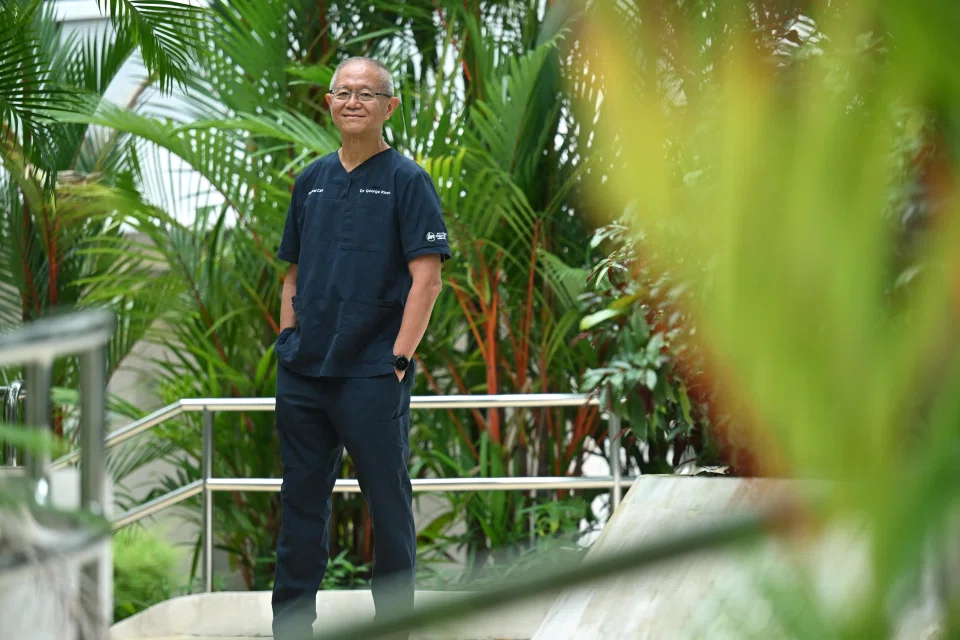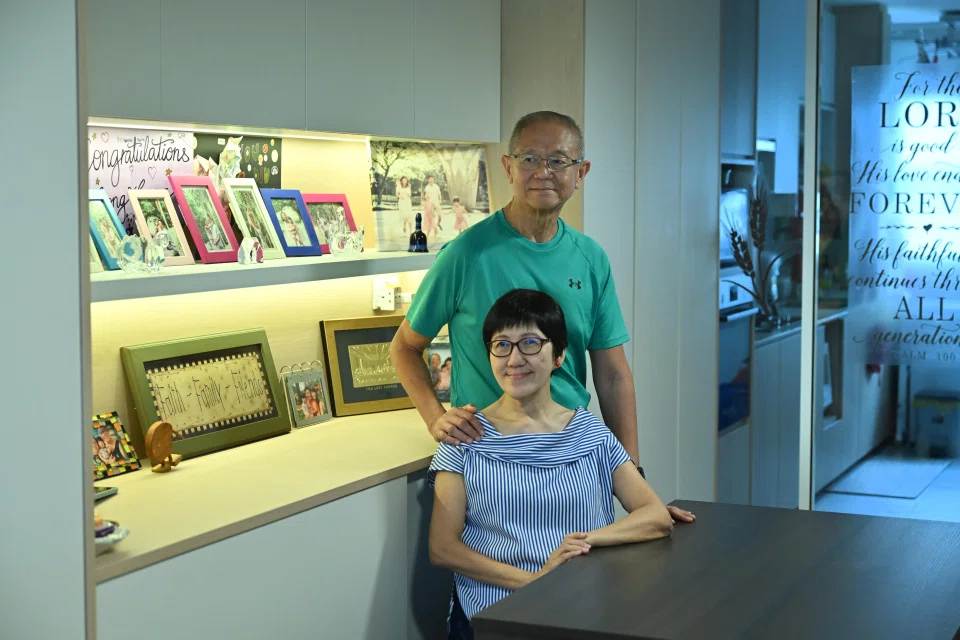Doctor who battled depression now fights mental health stigma
Joyce Teo for The Straits Times
Throughout his life, Dr George Khoo felt enveloped by an aura of melancholy that was occasionally punctuated by intense sadness.
Until he sought help about a decade ago, it never occurred to him that he might have a mental illness.
"When he was in his 30s, I thought he was having an early midlife crisis," said his wife Mabel, 68. "I even bought him a Christian book on men in midlife."
Dr Khoo, 65, a family physician, chimed in: "I also thought I was having an early midlife crisis!"
In 2014, there were many changes in his life, and his mood deteriorated.
His son and his daughter each got engaged, and his daughter began preparing for her wedding. Though it should have been a happy event, Dr Khoo began to grieve.
"We are a close-knit family, and we were about to lose her," he said, recalling how he had to steel himself for their home life to change.
Both his children were married in 2015.
Despite his taking Wednesday afternoons off work and exercising regularly, these self-care activities proved insufficient.
Then he enrolled in a graduate diploma course in mental health to gain a better understanding of mental health conditions to aid him in his work as a medical adviser to a Christian organisation.
"I didn't really have a lot of exposure to it (mental health), so much so that I honestly didn't know I was going through clinical depression, even as a doctor," he said.

Still, it took a few more months before he decided to seek help - and even then, he did it for the sake of his wife and children. He felt that it was not fair to see them suffer.
Dr Khoo was 54 when he was diagnosed with depression in late 2014.
The events that led to his diagnosis at 54
Throughout that year, attending other weddings only deepened his sadness as he anticipated his daughter's departure from home. "With each wedding I attended, I found myself getting more and more sad," he said.
In addition, he faced some challenges at his church, where he held a leadership position.
"Someone actually told me to my face, 'I don't think you should be a church leader. I think you should just step down, or I'd pray for you to step down'. So it kind of all happened at the same time," said Dr Khoo.
"I found myself in a low mood, just feeling sad, feeling down every day. Although I never really missed work, it was just so hard to get to work."
He was also very irritable; he felt hopeless, and was "very weepy".
Towards the end of this period, before the diagnosis, even completing tasks was a struggle. The added challenge was that he was responsible for the healthcare needs of the Christian missionaries in his organisation, including their mental health challenges.
He began to feel like he wanted to end it all.
Importance of medication
Dr Khoo openly shared his past struggles with suicidal thoughts, but the devout Christian acknowledged that this deeply sensitive topic might be challenging for some members of the Christian community.
"Sometimes, it's the stigma (that keeps people from talking about their thoughts of suicide), because it's like: 'Oh, you're Christian. How can you think of suicide? You know, you don't have enough faith. You know, that's why you're depressed.' That's quite sad because it is not true," said Dr Khoo.
"It's not a matter of 'I don't believe in God any more', but a cry for help. It's a signal that we do need help."
During his darkest moments, Dr Khoo said the thoughts of his wife and children pulled him back from the brink.
Today, he continues to take depression medication to keep his low mood at bay to function normally. He said that some people have a prejudice against psychiatric drugs, which unfortunately prevents them or their loved ones from getting the help they need.
He has encountered stigma around medication among friends, some of whom advised him against it.
"Sometimes, depression is situational, which is then easier to deal with because things become okay once the situation improves. But for some of us, unfortunately, it's also complex biological factors affecting the neurological system at play because sometimes there's just no reason why you feel down."
Dr Khoo said medication has allowed him to focus on what matters most to him: his wife, family, faith and improving his mental health.

After his diagnosis, he and his wife went for counselling, and he did an online cognitive behavioural therapy course that he had found online.
About four to six weeks after starting on medication, his mood began to lift.
Realising that his normal wasn't everyone's normal
Looking back, he said, he suffered from major depressive episodes almost every 10 years since his late teens. While they were triggered by different situations, he experienced similar feelings of hopelessness, worthlessness and suicidal thoughts.
He thought the persistent sadness was normal.
"One morning after I started the medication, I woke up and realised I did not feel sad. Then I realised that this was normal," he said.
He knows that he will be on medication for life, given his family history of mental health issues. His late mother attempted suicide on more than one occasion, and other extended family members had their own struggles with mental health.
Dr Khoo now works part-time as a family physician at the Institute of Mental Health (IMH), where he attends to the general health needs of inpatients.
Today, physical activity and self-care remain crucial to his routine, including cycling 50km weekly and running 4km up to twice a week.
Fighting the stigma
Since his diagnosis with depression, Dr Khoo has openly shared his experiences. His efforts included addressing the topic in a Christian book on mental health and, previously, on an online platform.
Like other mental health advocates, he aims to foster an environment of honesty and help to diminish the stigma associated with seeking mental health support.
Such efforts are crucial because while awareness about mental health concerns has grown over the years, some misconceptions and subtle biases remain.
"People may still assume that those with mental health conditions are less resilient, that recovery is simply a matter of willpower, or that seeking support reflects weakness," said Ms Andrea Chan, a representative of Beyond the Label, a nationwide movement to address mental health stigma.
"Recovery is rarely linear, and progress often comes with ups and downs. When such misconceptions persist, individuals may experience self-doubt or isolation, even as they continue to move forward in their journey."
Ms Chan, who is also the deputy director of Touch Counselling & Psychological Services, said awareness alone cannot eliminate bias, and the effects can be more pronounced for young people.
She cited an IMH youth mental health survey which showed that a third of those aged 15 to 35 with severe symptoms of depression, anxiety or stress did not seek help, citing concerns about judgment, privacy or doubts about whether support would help.
"When people respond with care rather than judgment, it validates the experiences of those with mental health conditions and strengthens their confidence to seek help, contributing meaningfully to their recovery journey."
Indeed, for Dr Khoo, who now has five granddaughters, it was his faith and the unwavering support of his wife and family that spurred him on the path to recovery.
"Knowing that his moods are not something within his control helps me to be more understanding and supportive," said his wife, a homemaker.
"Often, just being there, with a hug or scratching his back, does a lot more than trying to 'talk him out' of his low moods."

See something interesting? Contribute your story to us.
Explore more on these topics
